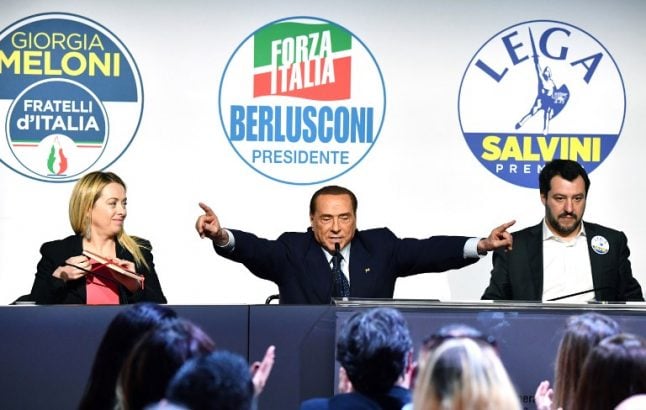Berlusconi, prevented from being a candidate because of a fraud conviction, has positioned himself as a kingmaker through his leadership of the centre-right Forza Italia (Go Italy, FI) and head of the four-party grouping that is expected to garner the most votes in Sunday's election.
The 81-year-old billionaire media tycoon, who dominated Italian politics for nearly two decades, said Tajani had indicated he would be willing to lead the coalition, if it wins the vote.
“He is someone who knows all of Europe,” Berlusconi said on Canale 5, one of his TV networks.
- Political cheat sheet: Understanding Berlusconi's Forza Italia party
- A history of Silvio Berlusconi's political gaffes
- Eight things that explain the enduring popularity of Berlusconi
The choice could put Berlusconi on a collision course with his europhobic allies, particularly with League leader Matteo Salvini, who has prime ministerial ambitions of his own.
But earlier, the former prime minister attempted to play down speculation of severe divisions between him and Salvini, as well as Giorgia Meloni of the Brothers of Italy (FdI).
“If there were no difference between us we wouldn't be a coalition, we would be a single party,” he said at a meeting of the parties in front of media and supporters in Rome, adding that coalition candidates all spoke by telephone “every day”.
Berlusconi overshadowed his three coalition partners at the event by arriving last and basking in applause and chants of “Silvio, Silvio” led by the assembled party activists. But the unity display was the one and only time all four coalition candidates, including Raffaele Fitto with his minor We Are With Italy party (NcI), will meet in public in this election campaign.

Photo: Andreas Solaro/AFP
'More Italy!'
Forza Italia and the League, the two parties within the rightwing coalition destined to pick up the most votes, are battling to come out on top in order to control who will choose the coalition's prime ministerial candidate. Tajani, who has been a close ally of Berlusconi ever since the flamboyant businessman first entered politics in the early 1990s, confirmed his decision on Twitter.
“I thank Berlusconi for his gesture of respect in my regard. I have indicated to him this evening my readiness to serve Italy,” he said.
Ringrazio Il Presidente Berlusconi per il suo atto di stima nei miei confronti.Ho dato a lui,stasera,la mia disponibilità a servire l’Italia.Ora ogni ulteriore decisione spetta ai nostri concittadini ed al Presidente della Repubblica
— Antonio Tajani (@Antonio_Tajani) March 1, 2018
The 64-year-old, considered an affable and canny networker with a fondness for luxury watches, took over the European Parliament presidency last year after more than 20 years in EU politics.
His nomination for the PM role reflects Berlusconi's preference for a pro-Europe, moderate rightwing line, while both the League and FdI bash an anti-Brussels drum.
“Some people say 'more Europe', I say 'more Italy!',” Salvini shouted at the campaign event.
Populist upstarts
The anti-establishment Five Star Movement is also expected to increase its support on Sunday. The party broke with tradition on Thursday by announcing its list of ministerial nominees, almost all of them political newcomers, before the election.
The M5S said it wanted to announce its choice for ministers early to distinguish itself from traditional parties, which it said would end up making backroom deals for ministerial posts once election results were in.
“This is not a government in the shadows but a government in the light of day for Italians. We are doing something that has never been done before,” prime ministerial hopeful Luigi Di Maio said at an event in Rome.
“Some people have mocked this decision but we will be the ones laughing on Monday,” the day after the election, the 31-year-old said.
- Political cheat sheet: Understanding Italy's Five Star Movement
- Five Star Movement accused of plagiarizing Wikipedia in election programme
- Is the Five Star Movement still 'anti-establishment'?
Among the nominees were three women for the posts of foreign, defence and interior ministers – all of them respected academics – and a swimming champion to be sports minister in a hypothetical M5S government.
But the M5S have been criticized heavily for their running of the Rome and Turin city councils since taking control of the two cities in 2016, and Berlusconi said he refused to “even consider” working with the party.
Also on Thursday, the neo-fascist CasaPound movement held a final campaign rally in Rome where leader Simone Di Stefano voiced confidence about the party entering parliament for the first time.
The rally passed off peacefully despite a counter-protest by leftist campaigners nearby and clashes between the two sides in the past.

Photo: Andreas Solaro/AFP
READ ALSO:
- The Local's complete guide to the Italian election
- What to expect after the Italian election
- These are the promises Italy's political parties have made to voters
By Franck Iovene and Terence Daley



 Please whitelist us to continue reading.
Please whitelist us to continue reading.